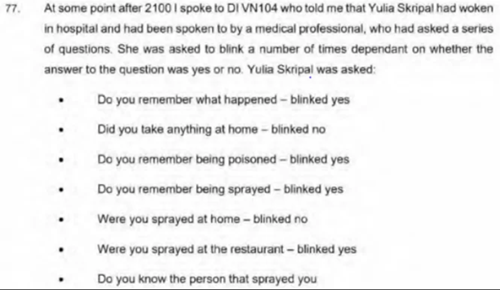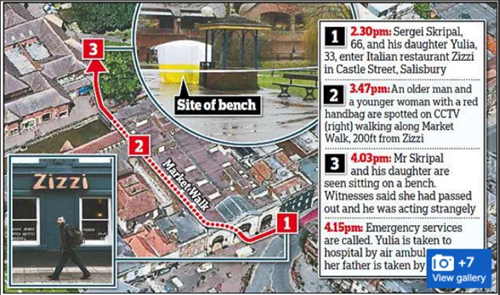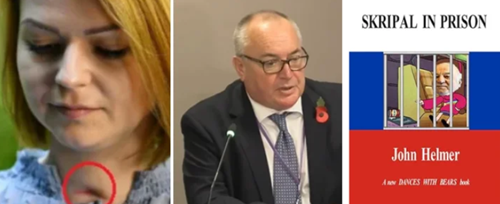Yulia Skripal communicated from her bedside at Salisbury District Hospital on March 8, 2018, four days after she and her father Sergei Skripal collapsed from a poison attack, that the attacker used a spray; and that the attack took place when she and her father were eating at a restaurant just minutes before their collapse on a bench outside.
The implication of the Skripal evidence, revealed for the first time on Thursday, is that the attack on the Skripals was not perpetrated by Russian military agents who were photographed elsewhere in Salisbury town at the time; that the attacker or attackers were British agents; and that if their weapon was a nerve agent called Novichok, it came, not from Moscow, but from the UK Ministry of Defence chemical warfare laboratory at Porton Down.
Porton Down’s subsequent evidence of Novichok contamination in blood samples, clothing, car, and home of the Skripals may therefore be interpreted as British in source, not Russian.
This evidence was revealed by a police witness testifying at the Dawn Sturgess Inquiry in London on November 14. The police officer, retired Detective Inspector Keith Asman was in 2018, and he remains today the chief of forensics for the Counter Terrorism Policing (CTPSE) group which combines the Metropolitan and regional police forces with the Secret Intelligence Service (MI6) and the Security Service (MI5).
According to Asman’s new disclosure, Yulia Skripal had woken from a coma and confirmed to the doctor at her bedside that she remembered the circumstances of the attack on March 4. What she remembered, she signalled, was not (repeat not) the official British Government narrative that Russian agents had tried to kill them by poisoning the front door-handle of the family home.
The new evidence was immediately dismissed by the Sturgess Inquiry lawyer assisting Anthony Hughes (titled Lord Hughes of Ombersley), the judge directing the Inquiry. “We see there,” the lawyer put to Asman as a leading question, “the suggestion, which we now know not to be right, of course”. — page 72.
Hughes then interrupted to tell the witness to disregard what Skripal had communicated. “If the record that you were given there is right, someone suggested to her ‘Had you been sprayed’. She didn’t come up with it herself.” — page 73. Hughes continued to direct the forensics chief to disregard the hearsay of Skripal. “Anyway the suggestion that she had been sprayed in the restaurant didn’t fit with your investigations? A. [Asman] No, sir. LORD HUGHES: Thank you.”
So far in in the Inquiry which began public sessions on October 14, this is the first direct sign of suppression of evidence by Hughes.
Hearsay, he indicates, should be disregarded if it comes from the target of attack, Yulia Skripal. However, hearsay from British Government officials, policemen, and chemical warfare agents at Porton Down must be accepted instead. Hughes has also banned Yulia and Sergei Skripal from testifying at the Inquiry.
The lawyer appointed and paid by the Government to represent the Skripals in the inquiry hearings said nothing to acknowledge the new disclosure nor to challenge Hughes’s efforts to suppress it.
Asman described his career and credentials in his witness statement to the Inquiry, dated October 23, 2024. His rank when he retired from the regular police forces in 2009 was detective inspector. He was then promoted to higher ranking posts at the operations coordinating group known as Counter Terrorism Policing for the Southeast Region (CTPSE). By 2018 Asman says he was “head of the National Counter Terrorism Forensics Working Group since 2012, and was the UK Counter Terrorism Chemical, Biological, Radiological and Nuclear (CBRN) forensic lead.” In June 2015 Asman was awarded the Order of the British Empire (MBE) “for services to Policing.”
At page 19 of his recent witness statement, this is what Asman has recorded for the evening of March 8, 2018:
 Source: Dawn Sturgess Inquiry — page 19.
Source: Dawn Sturgess Inquiry — page 19.
Asman’s went on to claim in this statement: “At this point Yulia Skripal was described as being emotional and fell unconscious. I made notes of my conversation with DI [Detective Inspector] VN104 in one of my notebooks, and in addition this information was confirmed to me in writing the next morning. The information she provided about being sprayed at the restaurant [Zizzi] was seemingly inconsistent with the presence of novichok at the Mill public house and 47 Christie Miller Road. On hearing this, I personally wondered whether Yulia Skripal knew more about it than she had alluded to and therefore whilst being fully cognisant of the SIO’s [Senior Investigative Officer] hypothesis and the need to be open-minded continued to prioritise her property.”
The Scene of the Novichol Crime
 Source: Dailymail.co.uk
Source: Dailymail.co.uk
The Evidence the Crime Was British
 Left: Yulia Skripal in May 2018, the scar of forced intubation still visible; read more here. Centre; Dr Stephen Cockroft who recorded the exchange with Skripal at her bedside on March 8, 2018; that was followed, Cockroft has also testified, by forced sedation and tracheostomy – read more. Right: read the only book on the case evidence.
Left: Yulia Skripal in May 2018, the scar of forced intubation still visible; read more here. Centre; Dr Stephen Cockroft who recorded the exchange with Skripal at her bedside on March 8, 2018; that was followed, Cockroft has also testified, by forced sedation and tracheostomy – read more. Right: read the only book on the case evidence.
Open-minded was not what the judge and his lawyers wanted from Asman when he appeared in public for the first time on Thursday, November 14. Referring precisely to the excerpt of Skripal’s hospital evidence, Francesca Whitelaw KC for the Inquiry asked Asman: “We can take that [witness statement excerpt] down, but this information as well, was it consistent or inconsistent with what you had found out in terms of forensic about the presence of Novichok at The Mill and 47 Christie Miller Road? A. [Asman] It, I would say, was inconsistent on the basis that she said she was sprayed in the restaurant.” — page 73.
Asman was then asked by Whitelaw to comment on Yulia Skripal’s exchange with Cockroft. “My question for you is: how, if at all, this impacted on your investigations? A. It only very slightly impacted on it…It was information to have but not necessarily going to change my approach on anything.” — page 73.
In the Inquiry record of hearings and exhibits since the commencement of the open sessions on October 14, there have been eleven separate exhibits of documents purporting to record what Yulia and Sergei Skripal have said; they include interviews with police and witness statements for the Inquiry; they are dated from April 2018 through October 2024. Most of them have been heavily redacted. None of them is signed by either Skripal.
Neither Yulia nor Sergei Skripal has been asked by the police, by the Inquiry lawyers, or by Hughes to confirm or deny whether Yulia’s recollection of March 8, 2018, of the spray attack in Zizzi’s Restaurant is still their evidence of what happened to them.










